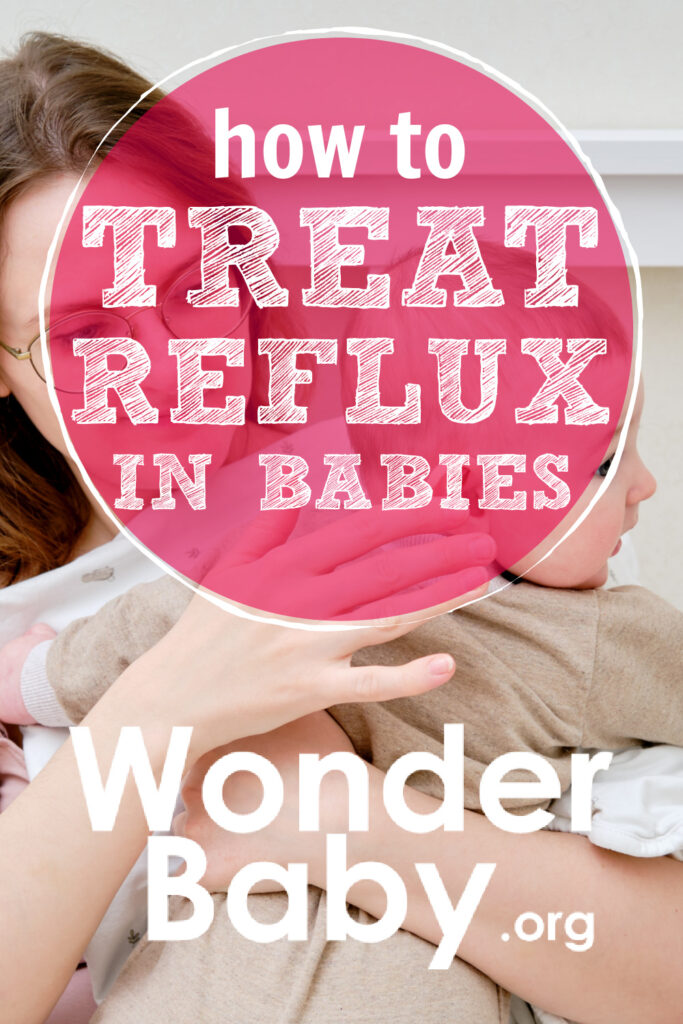How To Treat Silent Reflux in Babies

- Babies with silent reflux don’t spit up as much as babies with regular reflux
- Silent reflux can cause irritability and frequent crying.
- Silent reflux can be managed by sitting your baby upright for 30 minutes after each meal.
- Some babies need medication to help manage their reflux.
When my baby was around 4 months old, I reached a breaking point. It seemed like she never stopped crying, and there was nothing I could do to help her. She absolutely would not tolerate lying down, and would only sleep sitting upright with me carrying her. I was desperate for help and felt so bad for my constantly crying baby.
After several trips to the pediatrician, we found an answer: she had silent reflux. After trying a few medications and making some adjustments to our feeding routines, it was like I had a different little girl at home.
It felt like a miracle when I finally learned how to treat silent reflux in babies.
Silent Reflux in Babies: What Parents Should Know

Silent reflux can be difficult to spot because it’s not always accompanied by typical reflux symptoms like excessive spitting up or trouble gaining weight.
What is Silent Reflux?
Silent reflux is a condition where stomach acid gets past the esophageal sphincter and travels up the esophagus toward the mouth. This is also known as gastroesophageal reflux disease.
Because babies have underdeveloped esophageal sphincter muscles, they tend to spit up frequently. In silent reflux, the stomach contents don’t make it all the way to the mouth. Instead, they come about halfway up and get swallowed back down.
Signs and Symptoms
Instead of watching for frequent spit-up, notice if your baby’s symptoms indicate silent reflux, such as:
- Nasal congestion
- Persistent cough
- Noisy breathing
- Hoarse voice
- Poor weight gain
- Excessive crying
Causes
Some children are more likely to suffer from baby reflux than others. While not necessarily a cause, babies with a family history of gastro-oesophageal reflux disease are more likely to suffer from baby reflux themselves.
In addition, formula feeding is more likely to cause reflux than breastfeeding. Children with genetic conditions like cerebral palsy are also more prone to severe reflux.
Other causes of infant reflux include:
- Swallowing air
- Eating too quickly
- Immature digestive system
Complications
Ear infections, difficulty breathing, and poor weight gain are among the most common problems associated with silent reflux.
How to Treat Silent Reflux in Babies

If you notice that your baby is showing signs of gastroesophageal reflux disease, there are a few things you can do to help.
1. Check your latch.
Breastfed babies who do not get a good latch while breastfeeding will swallow more air as they drink. A baby’s stomach is too small to deal with both breast milk and extra air. You can talk to a lactation consultant to help improve your latch for you and your baby.
2. Get a slow-flow bottle.
Like having an inefficient latch, some bottles allow babies to swallow air as they drink. While bottle feeding your baby, pay careful attention to make sure that there are no big air bubbles in the milk.
In addition, getting a slow-flow nipple can help reduce reflux. Many babies using a large bottle nipple drink too fast, causing too much gastric pressure in their stomach. When their stomach fills too quickly, they are more likely to spit up.
Using a bottle that is specially designed to reduce gas can help manage babies’ reflux symptoms.
3. Burp frequently.
Most babies need to be burped after every feeding. If your baby seems to have a tender tummy or shows symptoms of silent reflux, they may need to be burped mid-feeding. Burping in the middle of feeding helps with reducing reflux by relieving pressure in the stomach.
4. Hold your baby upright.
Sometimes, reflux occurs because your baby is laid flat right after a feeding. Younger infants need the help of gravity to get their stomach flow going in the right direction.
After you finish feeding your baby, keep them in an upright position for at least 30 minutes. Most babies have an easier time keeping their stomach contents where they belong when they are sitting up than when they are laying flat.
5. Check for a milk allergy.
Milk allergies are rare in children, but if your baby is allergic to milk, it may be causing their reflux.
Breastfeeding mothers can adjust their diet to avoid all milk products, and formula-feeding families can switch to a lactose-free brand of milk.
6. Ask about medication.
If your baby’s reflux is severe, you may need to use a prescription medication. Your baby’s pediatrician may prescribe an H2 blocker or proton pump inhibitor. These are the same types of medication used to treat acid reflux in adults.
7. Try a special formula.
Some formula-fed babies do better when they drink a special formula designed to improve acid reflux symptoms. You may need a hypoallergenic, lactose-free, or soy formula to help your baby feel better.
What Happens if a Baby With Silent Reflux Is Left Untreated?

Usually, younger babies eventually grow out of their reflux. As your infant is able to eat solids and their gastrointestinal system matures, they are less likely to struggle with gastroesophageal reflux disease. However, some severe reflux may lead to an increased risk of long-term complications.
Asthma
According to the experts at the Cleveland Clinic11. Gerd (chronic acid reflux): Symptoms, treatment, & causes. Cleveland Clinic. https://my.clevelandclinic.org/health/diseases/17019-gerd-or-acid-reflux-or-heartburn-overview#:~:text=We%20don%E2%80%99t%20know%20the%20exact%20relationship%20between%20GERD,treating%20GERD%20often%20helps%20to%20relieve%20asthma%20symptoms, severe silent reflux may cause your baby to develop asthma or have difficulty breathing. This is because regurgitated stomach acid can leak down into your baby’s airways, causing irritation to the trachea and lungs.
Hearing Loss
Research shows22. Lin, B. M., Curhan, S. G., Wang, M., Jacobson, B. C., Eavey, R., Stankovic, K. M., & Curhan, G. C.. Prospective study of gastroesophageal reflux, use of proton pump inhibitors and H2-receptor antagonists, and risk of hearing loss. Ear Hear. 2017;38(1), 21–27. https://doi.org/10.1097/aud.0000000000000347 that when the middle ear is exposed to gastric contents, the tissue of the ear becomes damaged. If it happens frequently enough, this tissue damage can lead to hearing loss.
Fortunately, this complication is rare and only happens in the most severe cases of baby reflux.
SIDS
Sudden infant death syndrome is still a mystery to the medical community. Some research shows a link between SIDS and reflux in babies, while other research shows no correlation.
While the research is unclear33. Alex, N., Thompson, J. M., Becroft, D. M., & Mitchell, E. A.. Pulmonary aspiration of gastric contents and the sudden infant death syndrome. Journal of Paediatrics and Child Health. 2005;41(8), 428–431. https://doi.org/10.1111/j.1440-1754.2005.00660.x, it’s worth being aware of the potential risk of SIDS with severe reflux in babies.
When to See a Doctor for Your Baby’s Silent Reflux

Even though most children grow out of reflux, there are a few symptoms that warrant a visit to your pediatrician.
Seek medical attention if your baby shows any of the following symptoms:
- Poor weight gain
- Breathing difficulties
- Frequent coughing
- Wheezing
- Hoarse voice
- Pulling at ears
FAQs
Is silent reflux painful for babies?
Silent reflux can be a painful condition for some babies. In fact, silent reflux is often mistaken for colic. If your baby is difficult to console, seems uncomfortable when laying flat, or fights feedings, they may be experiencing painful silent reflux.
Can silent reflux cause SIDS?
Research about the link between silent reflux and SIDS44. Thach, B. T.. Sudden infant death syndrome: Can gastroesophageal reflux cause sudden infant death? The American Journal of Medicine. 2000;108(4), 144–148. https://doi.org/10.1016/s0002-9343(99)00354-x is mixed. Some researchers have found a link between silent reflux and SIDS, while other researchers state that aspiration of stomach contents is not the cause of death for babies with SIDS.
Since the link is unclear, it’s safest to monitor your baby’s symptoms and talk to your pediatrician if you’re worried about your baby and their risk.
Can changes in a breastfeeding mom’s diet help reduce the baby’s silent reflux symptoms?
Usually, a mother’s diet has no impact on the severity of silent reflux. Unless your baby has a milk allergy, breastfeeding mothers can continue their regular diet without worrying about causing problems for their baby.
What kind of formula milk is best for babies with silent reflux?
If you are worried about your baby’s reflux, you can purchase a baby formula that is specially created for babies with sensitive stomachs. You may need55. Adler, A.. Formula options for a gassy baby. Cleveland Clinic. 2021. https://health.clevelandclinic.org/what-are-your-formula-options-for-a-gassy-baby a hypoallergenic formula, a lactose-free formula, or a formula designed for babies with reflux.
References
- Gerd (chronic acid reflux): Symptoms, treatment, & causes. Cleveland Clinic. (n.d.). https://my.clevelandclinic.org/health/diseases/17019-gerd-or-acid-reflux-or-heartburn-overview.
- Lin, B. M., Curhan, S. G., Wang, M., Jacobson, B. C., Eavey, R., Stankovic, K. M., & Curhan, G. C. (2017). Prospective study of gastroesophageal reflux, use of proton pump inhibitors and H2-receptor antagonists, and risk of hearing loss. Ear Hear, 38(1), 21–27. https://doi.org/10.1097/aud.0000000000000347
- Alex, N., Thompson, J. M., Becroft, D. M., & Mitchell, E. A. (2005). Pulmonary aspiration of gastric contents and the sudden infant death syndrome. Journal of Paediatrics and Child Health, 41(8), 428–431. https://doi.org/10.1111/j.1440-1754.2005.00660.x
- Thach, B. T. (2000). Sudden infant death syndrome: Can gastroesophageal reflux cause sudden infant death? The American Journal of Medicine, 108(4), 144–148. https://doi.org/10.1016/s0002-9343(99)00354-x
- Adler, A. (2021, June 26). Formula options for a gassy baby. Cleveland Clinic. https://health.clevelandclinic.org/what-are-your-formula-options-for-a-gassy-baby/

The information WonderBaby provides is not intended to be, and does not constitute, medical or other health advice or diagnosis and should not be used as such. Always consult with a qualified medical professional about your specific circumstances.
Related Posts

Eye Conditions and Syndromes, Visual Impairment
Neuralink Announces Plans to Restore Sight to the Blind with Brain Chip
Elon Musk’s company Neuralink has announced plans to begin human trials of its new “Blindsight” brain chip by the end of 2025.

Health & Nutrition
Can Baby Skin Care Products Expire?
Is that forgotten tube of diaper rash cream still safe to use? Learn more about the expiration dates of popular skin care products for infants.

Health & Nutrition
Boosting Immunity in Kids: 3 Tips for a Healthy Winter
Parents can help boost their kids’ immunity during cold and flu season by maintaining healthy eating, sleeping, and exercising habits in the winter.